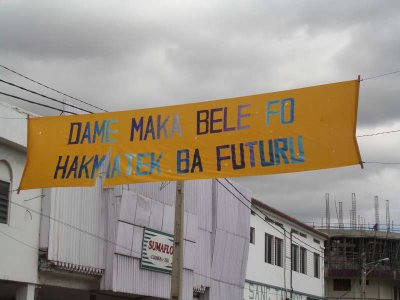The celebration of women and girls
As the women prepared food under a makeshift tarpaulin, we journeyed into town to have lunch at the Bali Sunrise which during the unrest moved from the beach road to behind the government building to take up residence beside two long established restaurants: the Erli Restaurant and Alpha Omega.
Bali Sunrise offer a buffet which has an excellent vegetarian selection. I ate beans and carrots, a leafy green vegetable, mixed vegetables, tofu and mushrooms, a piece of marinated tempe and white rice. During my stay in Australia, I really started to miss this kind of food, particularly the tempe which is possible to buy in Australia but generally only as a tempe vegetarian burger patty from the supermarkets. I also like the simplicity of this Indonesian influenced Timorese food. (Although, it is difficult to eat every day as you soon grow tired of it and want some variety, hence the inclusion of Indian food in our diet.)
After lunch we walked from the restaurant to my German colleague’s home which is opposite the now occupied (by Australian military personnel) heliport. Along the way we walked down one of the main commercial streets of Dili and where Daniel works in Komoro. The street was festooned with banners proclaiming unity and peace. I have included photos of these here with translations.
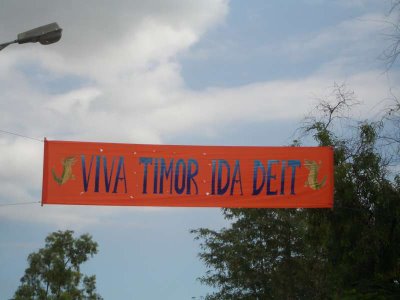 Long live! one Timor only
Long live! one Timor only
Carry peace
Peace can give peace for the future
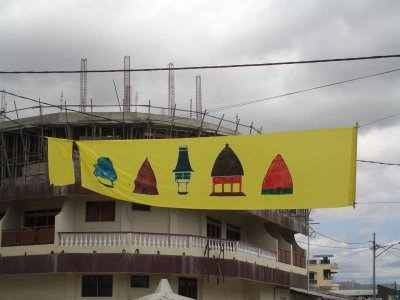
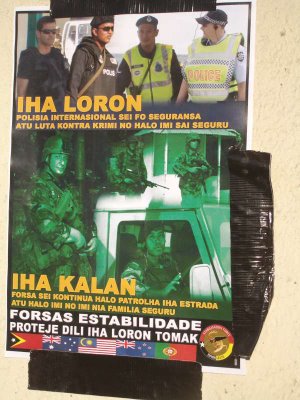 A poster advising of the role of the international Stability Force in Timor
A poster advising of the role of the international Stability Force in Timor
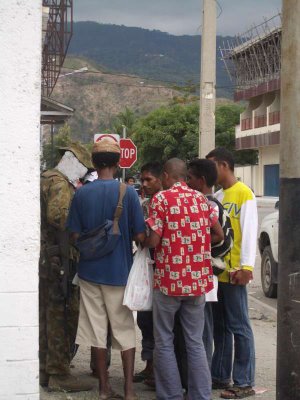 An Australian soldier (whose face we hid) surrounded by pirated DVD and cigarette sellers on the streets of Komoro in Dili
An Australian soldier (whose face we hid) surrounded by pirated DVD and cigarette sellers on the streets of Komoro in Dili
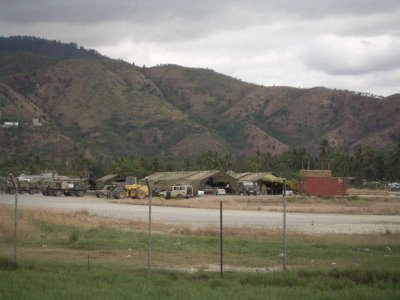 One of the Australian army's bases in Dili. This one is at the heliport opposite where we are staying during the week in Ai-tarak laran, Dili.
One of the Australian army's bases in Dili. This one is at the heliport opposite where we are staying during the week in Ai-tarak laran, Dili.
As we came to the Komoro junction, we turned a corner to find a horde of men standing around a tall Australian army officer trying to flog him pirated DVDs. It looked however as if he were surrounded and I was just glad that their attention was on him and not me because one of the things I most dread about coming back to Timor is feeling once again that I am under siege.
My colleague greeted me warmly and was genuinely happy to see me again. She had remained in Timor during the unrest and had to fight for her right to do so as the German Embassy in Indonesia had demanded the evacuation of all their citizens. My colleague is paid by the German government through their Peace Building Program to work in Timor for three years with the Timorese NGO we both work at. She is about to sign another three year contract to enable her to continue working with our NGO. There are currently another three people (all women) on this particular German program in Timor. All four of them elected to remain in Timor and negotiated with their sending organisation (AGEH) to stay. Only my colleague is based in Dili; one is in Baukau and two are in Aileu.
My colleague is leaving for a very much needed eight week holiday to Bali, Germany and Switzerland (her home for twenty years) tomorrow and has offered to let us stay in her home during her absence. We have decided to partially take her up on her kind offer by staying at her house during the week and returning to our home on the weekends. Her home is within walking distance to both our workplaces and given the lack of transport after dark we thought it less stressful to stay at her place part of the time. Moreover, she has a television and a DVD player and during our holiday in Australia, I believe I accidentally damaged the LCD in our laptop’s screen which has left us with a small amount of screen space. As I had gone on a DVD shopping splurge in the months leading up to our evacuation, we have rather a lot of DVDs to watch!
My colleague and I were picked up by her driver (yes, she has a driver and a car, something completely alien to me as a former AVIer which is a no frills experience) and taken to our NGO for its ninth birthday celebration which was to include a discussion on recent events. I was a little apprehensive about seeing my colleagues again for fear of how they might react after my prolonged absence. They appeared however in the main to be genuinely happy to see me again which was a relief. One of my colleagues who was always eyeing off my personal possessions didn’t disappoint, she immediately stared at the sunglasses on my head (a new pair as I had lost the previous pair in Cairns) and there her eyes remained during our brief conversation!
My Timorese colleagues are truly remarkable women: brave and steadfast in the face of a crisis; they have continued to support women and children during the past two months despite their own often precarious personal situations. For example, three of my colleague’s homes were burnt down, for reasons unknown and two of them, along with their young families are living at our work place. (In fact the outside aula (meeting room) was full of IDPs related to our colleagues.) One of these colleagues had also become acting Director in my absence as I learned that our Director who had given birth to her third child in late March and who was due back at work three months later, had taken her three children to Australia to stay with family in Perth. She will return in September. My colleague who had given birth a week later remains living in Baukau and is not in good health since she lost a lot of blood after having an induced labour. I am told she is receiving medical care but I wonder about its quality.
Most of the rest of my colleagues were in attendance for the celebration. We had a two hour discussion in Bahasa Indonesia mixed with Tetum, some of which was translated for me and my German colleague into English. I was also able to read a summary in English of a report about the current situation of women in Timor written by my NGO. I read the report with some emotional distance as I really didn’t want to suffer another breakdown as I did after reading many harrowing documents about the brutal occupation of Timor by both the Japanese (WWII) and Indonesians (1975-1999). It surprised me how I could read such a document without being drawn in too far.
The situation of the IDPs is of concern as there are approximately 100,000 (10% of the population) still living in camps throughout Dili and the districts with only small numbers electing to return home. (In early May, soon after the events of 28 April, there were approximately 30,000 IDPs.) Many visit their homes during the day but return to the camps in the evenings. There are a number of issues which mitigate their returning home apart from the obvious one that some have no home to return to as they were burnt down. Firstly, some do not feel safe in their communities as they fear retributions are still to come. Furthermore that they cannot rely nor do they trust that the vastly reduced PNTL (police) will do their job of keeping the peace; and that a culture of impunity has been established in Timor which extends back to the failure of the government to pursue justice for the occupation of Timor by the Indonesians. People believe that if you commit a crime, you’ll probably just get away with it which does not make for a safe and secure society. Secondly, people are being looked after in the camps, many better than they can take care of themselves at home; food aid is given out regularly and some eat better than they would normally. Thirdly, even if they do go home and although the government has promised to provide these people with food, they do not believe this will happen. The IDPs have more confidence in the INGOs to deliver them food than they do in their own government.
The issue of why angry young men became ready arsonists was also discussed. It appears that many people are jealous of those who have done well since independence. Thus any person with obvious wealth (eg small business people) were targeted. Often these people are from the east as that part of Timor is, for various reasons to do with geography and history, wealthier than the west.
We concluded the discussion with a shared meal of bananas, sweet potato, cassava, tomato and chilli salad, fried pork, cakes and ice cream. As I had eaten a large lunch combined with the fact that I do not like to eat large chunks of unappetising starchy food, I simply had some appetising cake and ice cream. Upon leaving the celebration I told my colleagues I would come in on Monday morning as a true volunteer (unpaid) and attend to anything they might need doing. At least one task is to complete fixing the virus problems that plague the computers and USBs. I’m no computer expert but Harry the Indonesian who owns/works at I-Market Computers, was an enormous help before I was evacuated so I will pay him another visit. Daniel collected me in a taxi at 6:30pm as we were conscious of getting home before dark when taxis all but disappear from the streets.
As we walked down our street we came across Robert, a lovely and handsome young Timorese man who lives on his own. He was very happy to see me again. He is studying English at university and is currently volunteering with the Australian military as a translator. In return they give him food. If after two weeks they are happy with him, they will offer him paid work. I told him I hoped that he would be successful.
Upon entering our home we heard many little children next door singing happy birthday over and over again. I thought perhaps the party was for a child rather than an adult but had witnessed very few parties for children (other than the three christenings they undergo throughout their childhood) as Timorese in general do not celebrate birthdays. I wondered who the celebration, and in whose name the life of the goat was taken, but for the moment was glad that the party ended early.
We again went to bed early while listening to the BBC World News Service.

